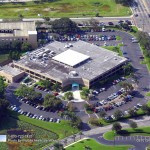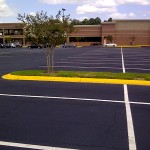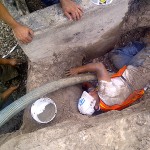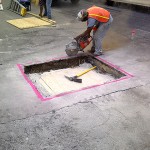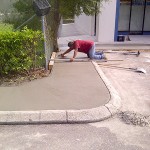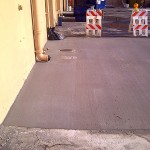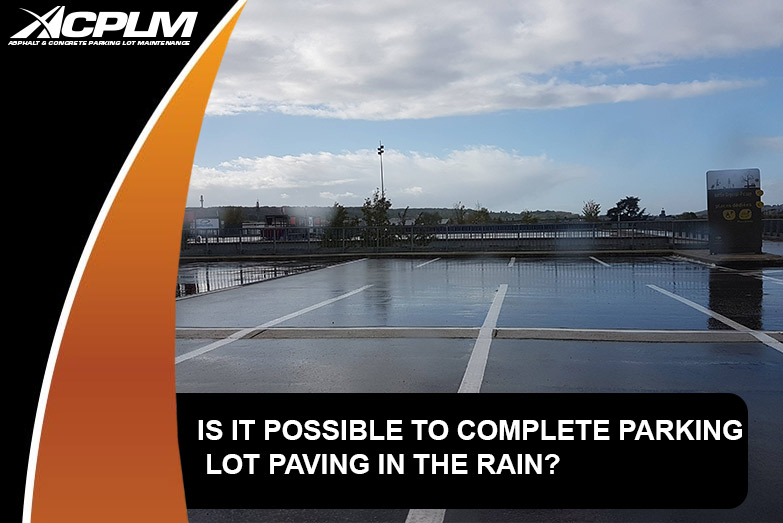
Can paving projects be completed in the rain?
The short answer is – NO.
New asphalt pavement tends to be more delicate and vulnerable just after installation. If the new pavement is exposed to rainfall, it can weaken the asphalt material, resulting in significant cracking and faster wearing.
Contractors are often forced to remove and replace asphalt pavement installed during or after a heavy rainfall. Alternatively, routine density testing and specialized direct shear testing of the interface bond strength is required to provide a sound basis for a rational assessment of the impact of the rainfall on the asphalt surface.
Unfortunately, the assessment, too, is a complex and expensive process that may only mean more time and resources spent on the paving process. Worse still, if the bond strength is found to have been severely weakened (which is almost always the case after heavy rainfall), removal and replacement of the asphalt pavement is the only viable long-term solution.
How Paving in the Rain Affects Asphalt Projects
So, perhaps you’re wondering how rain would affect the paving process. Paving in the rain or during the rainy season affects asphalt projects in four main ways:
Accelerate the cooling process
Asphalt paving is typically completed with Hot Mix Asphalt (HMA) rather than cold mix asphalt. There are multiple reasons for this, including HMA’s inherent strength, weather-resistance qualities, and the material’s ability to bend without cracking. However, the asphalt must be allowed to cool at its own pace to achieve the desired strength and bending-ability.
Paving in the rain compromises this goal by accelerating the cooling process by as much as 99%. Additionally, faster cooling usually traps steam that eventually condenses to form water, which can cause cracking.
Paving in the Rain Causes Water Seepage Issues
It’s not just trapped steam that can get water into the asphalt sub-surface, though. If there’s heavy rainfall during or immediately after paving, water can also seep into the sub-structure through the sides. This mostly happens if there’s water pudding around the pavement that lasts several minutes or hours.
Water expands during the cold weather and contracts when it gets warm. This expansion and contraction can cause cracking and even stripping. Stripping refers to the loss of bond between aggregates and asphalt binder.
Oil Repellent Properties
Almost all asphalt used in paving and general repair comes from petroleum crude oil. Both forms, however, contain oil in significant amounts. The oil is a core ingredient without which asphalt would be useless.
Unfortunately, water and oil don’t mix. When the two substances come into contact during rainfall, they will separate, with oil going to the top and water to the bottom. When this happens during asphalt paving, the integrity of the asphalt material is compromised, resulting in cracking and potholes.
Paving in the Rain Makes Compaction Difficult
Finally, paving in the rain also interferes with the compaction process. Asphalt pavements are applied over a thick base of crushed rock known as aggregate. If it rains during the paving process, the aggregate will become filled with water. This makes it nearly impossible to bond the base materials properly. The result is usually faster wear, including quicker development of cracks, if the asphalt is laid before the sub-base dries.
Even worse, a wet sub-base cannot support as much weight as dry ground. If you apply asphalt to a wet sub-base, there’s a very high chance of the pavement cracking and caving in.
Any Standing Water Must Be Dried Up First
Where possible, avoid paving in the rain altogether. However, in the unforeseen circumstance that there’s light rain during the paving process, proper drainage is needed. More importantly, after the rain stops, the area must be thoroughly dried before construction work resumes.
Need Asphalt Paving in Florida, Contact ACPLM
ACPLM is a trusted asphalt repair company serving Tampa Bay commercial property owners. We specialize in asphalt paving, pavement repair, concrete repair, parking lot sealcoating, and general parking lot maintenance. Contact us today for more information.








